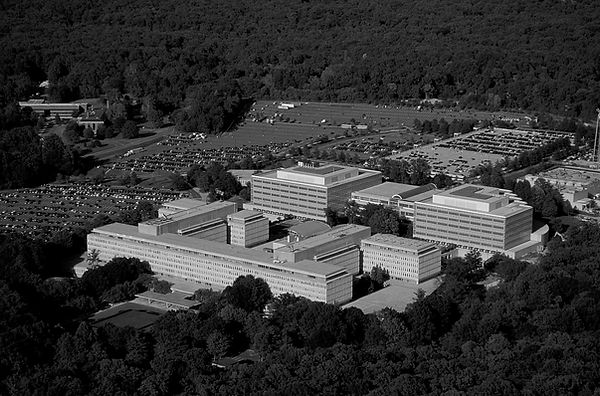top of page
Project Overview

CIA Headquarters, Langley, Virginia, USA
Did Russia influence the US 2016 elections? Were Russia's intelligence agencies involved? Since the US elections, spies, espionage and covert action are back on the front pages. As a case in point, a day after his inauguration, US President Donal Trump gave a speech at the CIA Headquarters in Langley, VA. In the speech, he suggested that the CIA had not received enough 'backing' in its fight against terrorism. Since 9/11, however, the CIA, as well as its British counter-part, MI6 have played a leading role in the fight against terrorism. Their powers and capabilities have expanded and this has included an increased reliance on covert action.
Covert action has a long history in both Britain and the US. The term often refers to intelligence activities that go beyond the simple collection of information. These activities are aimed at influencing political, economic, or military conditions abroad and include propaganda, economic action, paramilitary operations (including regime change), and lethal actions (such as assassinations and/or targeted killing).
In academia, the interdisciplinary nature of covert action has often meant that researchers working on the topic have found it difficult to share research and experiences. Furthermore, the 'sensitive' nature of the topic has often meant that covert action is not discussed in the classroom and is not considered part of the curriculum. However, debates surrounding covert action can influence and are part of several areas of schools' curricula. These areas include US/UK politics and history, warfare and changes in the nature of war, literature and fiction, as well as critical thinking.
This project is funded by a British Academy Rising Star Engagement Award. The project has three main aims. First, the project aims at establishing a network of Early Career Researchers (ECRs) working on covert action in US and UK history. This network will provide an opportunity to share research and discuss developments in the discipline. Second, the project aims at engaging teachers and students from secondary schools in the study of the topic.
A networking event in May, will give ECRs the opportunity to meet and share their research. Having established an ECR network, the project will reach out to secondary schools. An engagement and continuing professional development event will be held in Swansea University in September. The event will give academics and teachers the opportunity to get together and discuss avenues to include covert action in secondary school education both as a curricular and extra-curricular activity. Finally, the project aims at establishing a longer-term collaboration with schools. This will include seminars and presentations conducted by ECRs in interested schools and essay writing competitions.
We are very excited to start this project. In the meantime, you can browse the website and get to know the team, follow us on Twitter @OotsProject, and you can share the project with your friends and colleagues. Please get in touch.
Resource Packs
As part of our project we are creating resource packs for schools. They can be used to teach a broad range of topics connected to British and American foreign policy, intelligence, the Cold War, and the Cuban Missile Crisis.
The first resource pack is a general one regarding topic connected to the project. The second pack is a more specific pack providing resources (primary documents, secondary sources, links, and short summaries) on the Cuban Missile Crisis.
Role-Plays
Below you can find two role plays.
The first deals with the Italian elections of 1948. The elections represented a crucial moment in the early Cold War. The US feared a success of Italy's Popular front and a drift of the Italian government towards the Soviet Union. The CIA was given free-hand to guarantee the success of the Christian Democrats. The role play explores the political situation in Italy and asks students to engage with the idea of covert action and electoral interference by playing key actors in this early Cold War confrontation. The role play introduces students to key concepts and ideas like: the Cold War, covert action, the role of intelligence agencies, elections and voting.
The second deals with a fictitious decision by the US government to conduct a drone strike against a suspected terrorist in the FATA areas of Pakistan. The narrative is vaguely inspired by the raid against Bin Laden's compound. The decision is influenced by developments in Pakistan and by debates at the United Nations. The role play introduces students to key concepts and ideas like: the UN system, US alliances, US foreign policy decision-making, drones (legal, moral and strategic aspects), terrorism and counter-terrorism.

The project is funded by a British Academy Rising Star Engagement Award.
It aims at establishing a network of ECRs researching covert action in US and UK history and at engaging secondary schools students and teachers.
Let's bring covert action to the classroom.
Project contacts:
Luca Trenta
Department of Political and Cultural Studies
College of Arts and Humanities,
Swansea University,
Singleton Park,
SA28PP
UK
Tel: +441792602633
Email: l.trenta@swansea.ac.uk
@lucatrenta
RECENT POSTS:
SEARCH BY TAGS:
COPYRIGHT NOTE
You may not copy, reproduce, republish, download, post, broadcast, transmit, make available to the public, or otherwise use the 'Out of the Shadows' content in any way except for your own personal, non-commercial use in classroom environments. You also agree not to adapt, alter or create a derivative work from any 'Out of the Shadows' content except for your own personal, non-commercial use. Any other use of 'Out of the Shadows' content requires the prior written permission of Dr Luca Trenta.
bottom of page


